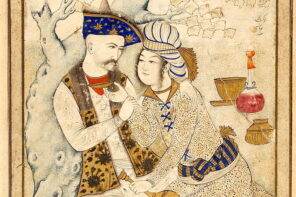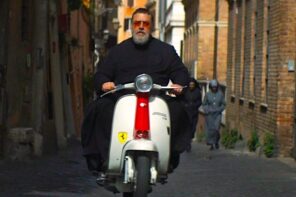Between 2005 and 2013 Joseph Ratzinger moved from Cardinal to St. Peter’s Successor to Pope Emeritus, during which time I instead—what’s the word I’m looking for here?—pursued my graduate education. Benedict has now moved sideways, the retired academic who had a straight line to God he decided he didn’t need—something like tenured Professors, only Popes can fire themselves—but I’m still on his Pope phase, so to speak. See, I’m catching up on what he wrote. I thought about applying to be Pope in the meanwhile, though the only qualification I really have is I’m less likely to offend the Muslim world.
In the wake of his controversial Regensburg lecture, I may well have been the only Muslim to have welcomed the Pope Emeritus’ three-part series on Jesus. That’s because I’ve long been fascinated by Jesus as a Prophet and Messiah (as he is in the Islamic tradition), and as the Son of God (as he is in the Christian tradition). Probably a lot of that had to do with growing up around very religious Christians—mostly Catholic but some Protestant—who I deeply admired. I was also, I confess, jealous. See, if you are a Jewish or Christian American, probably you can find religious literature everywhere you look, and from various perspectives. (To be honest, though, the former Pope’s series was too dry for my taste.)
Go to your local Barnes & Noble (seriously, before it’s gone, so you can describe it to your kids)—the religion section may well have bookshelf after bookshelf devoted to Christianity especially, and then the Jewish tradition. There’s a lot to look at, from Ross Douthat’s allegation that you’re all heretics (I’m still on the first chapter) to G. K. Chesterton’s very English Orthodoxy, to Joel Osteen’s self-help, generically-Christian Christianity (at least, so far as I can tell.) I just started Polish Catholic philosopher Leszek Kolakowski’s Is God Happy? As for Jewish voices, I just read Harold Kushner’s The Book of Job.
When I finished it, I started all over again. What other choice did I have? As an Anglophone Muslim, it’s a little harder to get the same range at your local bookstore’s Islam section. Firstly you might find Islam under ‘eastern religions,’ which is like finding your parents’ cuisine under ‘ethnic food’ (white people, apparently, don’t have an ethnicity, to which the universe has responded with Jersey Shore.) Then, when you actually locate Islam—organizationally speaking—somewhere nearby, half the books are devoted to telling you what’s wrong with Islam, and precious few actually give you anything good to go by. Where is the serious literature by thoughtful Muslims engaging their faith?
This is unfortunate and depressing. It’ll change as American Muslims come of age, but that’s going to be a gradual process. Meanwhile we watch in measured envy. Consider The Bible, the History Channel’s 10-part series reviewed by Paul Harvey here on RD. Tragically but logically, there can be no similar series devoted to the Qur’an, first because we’re not ready to go there, and second because, how? The Muslim Holy Book isn’t a narrative, or a series of narratives, which has surprised many a first-time reader. Of the Muslim scripture’s 114 chapters of wildly varying length, only one is devoted to telling a story: Joseph’s. From his ugly abandonment by his brothers to his unexpected rise to power in Egypt, to the the happy if still awkward family reunion down the line.
But this doesn’t mean the Muslim world doesn’t produce its own literature and media, which has progressively become more and more sophisticated in terms of the quality of storytelling and production. Until the rise of social media and indigenous film production, though, this media was mostly the written word or audio lectures, which translated poorly (largely because they were never translated). We translated what got the most play, what was most interesting to us as Westerners, not what took the Muslim world by (sand)storm. (Which is funny and inaccurate, since most Muslims live in warm and humid climates like South and Southeast Asia’s.)
But if you’re intrigued by the History Channel’s The Bible, either the actual series or the subject matter, and want to see its televised twin—especially, but not only, if you come from the Muslim tradition—I’d recommend MBC’s 30-part series (ha, take that, The Bible!) Omar, devoted to the life of the Prophet Muhammad’s father-in-law. Omar began his life as a fierce enemy of Islam, nearly killed Muhammad in a fit of rage, converted to Islam on the same day he planned his assassination, and ended his life as the second Caliph of Islam. Under Omar, the first Muslim polity expanded into Jerusalem, Damascus, Egypt, Iraq, Iran, and Central Asia. (Muhammad died in 632; Omar was Caliph from 634-644.) That’s some good television.
It’s also surprisingly nuanced, considering what I grew up learning in Sunday School. Omar is one of the so-called “musalsilat,” series that are produced specifically for the Muslim holy month of Ramadan. Every night, after a) drinking, like Bosnians allegedly do (ask Michael Birnbaum), or b) overeating, like practically every Muslim does, to mark the close of the day’s fast from food, drink, sex and cigarettes, many Muslims watch programs that are divided over 30 days to keep the viewer hooked and inspired over the course of an exhausting sacred calendar. So yes, the series can be overly long at times, and there’s too much dialogue, but for Americans who are used to the frenetic, almost nauseating pace of contemporary entertainment, a more langorous pace is a Godsend.
The series was filmed in standard Arabic, but very accessibly subtitled into English, and available free on YouTube. It’s an insightful perspective into how Muslim heritage and history are celebrated by Muslims today. Rather than focus on differences (though those are interesting too), consider the common threads and approaches. Islam is a living tradition. Just as in Jewish, Christian, and other faith traditions, contemporary Muslims struggle with (the word is jihad, by the way, but don’t take it the wrong way) their texts, key ideas, and heroes (and heroines). Omar is such a figure. Whereas Muslims long identified the worst ruler with Pharaoh—up to and including the most recent revolutions—Sunni Muslims identify Omar, and Shi’i Muslims ‘Ali’ (the Prophet’s cousin and son-in-law) as the ‘ideal,’ ‘most just’ and ‘virtuous’ of leaders.
It’s worth noting, for example, that Omar is remembered within the Sunni Muslim tradition for his fraught relationship to power. “I do not know what I would say to God,” he’s recorded as having said, “were a dog to die of thirst on the banks of a river under my domain.” He feared power, and approached it gingerly. So we should see much of what this musalsilat tries to do as a somewhat veiled (ugh, yes, I just used that verb) jab at the condition of Muslim politics today. What most surprised me though are the show’s treatment of class and race.
The wealthy Meccan elite, who almost down to the last man opposed Muhammad, are portrayed as sophisticated characters whose concerns about Islam are not artifice or mere posturing. And the show’s treatment of race is no less amazing. Muhammad was raised by a surprising number of women—especially African women—which undoubtedly influenced his approach to race in a society deeply riven by genealogical, economic, and racial barriers. That aspect constitutes many of the show’s long-running subplots, which occasionally intersect with Omar’s life story, but which otherwise are deemed sufficient to stand alone. These are themes that will, without a doubt, unsettle many viewers, and hopefully push them to a different understanding of a very critical, yet very distant, period of Islamic history.
But there are other gaps. Omar’s relationship to women, for example; certain critical incidents in the Prophet Muhammad’s life are passed over—and though I haven’t gotten through even half of the series yet, I expect that, after the death of the Prophet Muhammad, the differences that led to Sunni and Shi’a Islam will not be focused on. Considering how sensitive the sectarian environment has become in the Arab world, that’s an understandable decision. But how are these differences in interpretation, controversial episodes, and disputed legacies going to be affected by the pop culture serialization of history?
Ultimately, Omar is religious entertainment, a sign that at the end of the day we all like stories—especially after we’ve eaten too much and it’s too much of a jihad to lift ourselves away from the television or computer or whatever. The rise of Muslim middle classes means very different people have trouble finding the same, frequently Samsung remotes despite allegedly impassable civilizational boundaries.
With the rise of a global Muslim middle class, all kinds of people from Morocco to Indonesia will have the same problems we do: Where’s the remote, and why can’t I get myself up to get it? Take that, Samuel Huntington.
Sit back and enjoy the sartorial convergence of Abrahamic monotheisms, whether Western or grocery store ethnic: Everyone in the desert dresses the same. But it doesn’t end there. There’s something about the unyielding harshness of those apparently lifeless places that got wandering Hebrews and shepherding Arabs thinking about where life started and where it would end, and what to do in the meanwhile.




